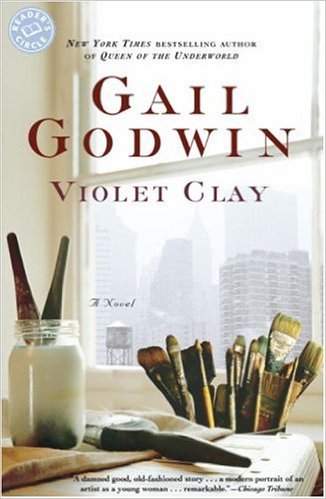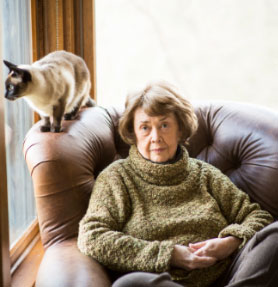Book Excerpt
 Violet Clay
Violet Clay
A Novel
Published 1978
Obsolete Heroines
Harrow House Gothics was on the twenty-first floor of a modern office building. But the décor of its labyrinthine corridors -- once you got past the receptionist who guarded the massive, phony "oak-carved" door just beyond the elevator -- matched the mood of its staple product.
I rather liked that mood. I felt at home in it. The walls were papered in a dark rose color, with fake wainscoting. Deep brown carpeting muffled the sound of your step. Unless you happened to meet the rare assistant, rushing through the gloom with a batch of proofs or contact sheets, you might easily convince yourself you were an orphaned relative, wandering through the eccentric picture gallery of a Victorian aunt. The "paintings," enormous blowups of cover illustrations, were framed in ornate gold leaf and illumined kindly by Tiffany "gas lamps" with 25-watt pink-tinted bulbs. All those young women running away from all those houses! One of my own illustrations hung here. I had painted it some time ago. I could remember the name of the book, The Solitary Cry, and even the plot (a cast-out wife who returns to utter threatening warnings to her successor through a complicated apparatus connected from the gazebo to the main house), but today, as I stood before my own work, a painting I had spent time upon, I couldn't for the life of me remember applying a single stroke of the brush.
In the old days, when Williamson, the nice art director, had been in charge, I had looked forward to dropping down to the office, to deliver or pick up an assignment -- or often just to chat. He had made his office atmosphere as rose-colored as the soft, flattering light that fell on our illustrations in the corridors. There, among his nostalgic clutter of bric-a-brac, he offered his illustrators Chinese tea in paper-thin cups and made us feel comfortable with what we were doing. He liked to banter, with an easy, knowledgeable irony, about "books and pictures" as he called them. He made it all seem relative when he told you to make your next girl's cloak a velvet one, "with that nice, rich van Eyek-y quality you do so well, Violet," and you sipped your smoky tea and gazed up in smug horror at some melodramatic print he'd torn out of an old book and pinned on his wall. A woman sunk in prostration at the feet of a stern man, her faulty drapery stacked in unconvincing folds about her ankles . . . van Eyck would turn over in his grave. You left Williamson's office feeling that what you were going to do wasn't so bad when you considered how what had been done already wasn't all that good.
Doris Kolb had removed every trace of her predecessor's bric-a-brac and had the walls painted white. She had aired him out completely, poor Williamson. Gone were the soft-glowing turn-of-the-century student lamps; she preferred overhead fluorescent. After the rose-and-brown-tinted corridors, her stark office assaulted your eyes with the unfriendly glare of a police line-up.
Her door was open and she had her back to me. She was tacking up some photographs on her wall. Well, well, so old Doris of the bare desk and blank walls was going to let us in on her tastes, at last.
I knocked on the molding of the door, for form's sake.
She did not turn; she just went on with what she was doing. It was as if, I had noticed in my few meetings with her, her stimulus-response equipment worked more slowly than most people's. That or something more sinister: that her simplest act was calculated to produce a certain desired employee reaction, and she had no time to waste on the superfluities of ordinary human intercourse. All the artists disliked her, or were a little afraid of her. Several rumors had developed about her flatness and inscrutability, the most appealing being the one put forward by one of the fired artists, which was that she was some kind of robot, an expensive, computerized mass of wires and electrical responses purchased for greater efficiency by the great conglomerate that controlled us all. Another artist said she was the niece of one of the directors, that her background was in neither art nor design, but in marketing research. Someone else was sure they had seen her working formerly in the accounts department at a department store.
She decided to turn around. "Hello," she said.
She was not a bad-looking woman. She had a round, smooth, precisely made up face, two spots of color in the cheeks, like a doll's, and clear, flat brown eyes that didn't blink very often. Her nose was long and narrow, turned up a little at the end, like those illustrations of Mary Poppins, and it occurred to me as I sauntered over to look at her photographs (since she was not, apparently, going to ask me to come in) that her nostrils were too narrow to allow for even the most minimal nose-picking. You thought things like that, with Doris. They surfaced, as crude jokes will in repressive surroundings. She always wore the same thing. A white blouse and dark pants. Was she a unisex adherent or was there something ugly about her legs? It was hard to guess her age from the expressionless face. It reminded me a little of those plaster casts I had drawn from in art classes. She was roughly between twenty-nine and forty, as far as I could tell.
"I see you're putting up some photos," I said, drawn as usual into fake cheerfulness by her silence. "They look interesting -- what on earth are they? Photographs of women screaming?"
"I'm so excited about these," she said flatly, tearing her eyes away from the one she had just tacked up and looking at me for the first time. I seemed to remind her of an unpleasant duty, for she looked at once away again, back at her pictures.
So I looked, too. All of them -- there were about ten -- were close-ups of women screaming. Just their faces. The backgrounds and the bodies had been taken out by a vignetter.
"How . . . unusual," I said, walking up and down the row of them. The more I looked, the more uneasy they made me. It took me a few minutes to figure out why.
Doris just stood quietly, waiting. It seemed to please her when I said at last, "But . . . aren't these photographs of real screams? I mean, these women seem to be in real trouble!"
"Oh, yes, they're in real trouble, all right. These are real screams. Not painted ones."
"But . . . how . . . ?" I kept coming back to one photo. A female face contorted with such emergency that there was no question of pose. The hair lay back at an odd angle for an upright head. As if this photo had been made of someone lying down, and then turned around. There was a highlight of spittle at one corner of the mouth. The eyes were no joke either. I had never painted terror like this into the shrunken pupils of my heroines.
And the whole thing haloed in the simple, cameo-like vignette.
"These were done by a talented young woman named Vicki Valus," said Doris. "The one you keep looking at . . . the girl in that picture was actually being raped at the time that was taken. "
"But how . . . ?"
"Telephoto lens."
I had been about to ask: How could someone stand by and take a picture when another woman was being raped?
"It was right outside her apartment," added Doris. "It was already happening. There was nothing anyone could do."
"Except take a photo," I said dryly. I kept staring at the screamer, fascinated in spite of myself. So this is how you would look if it happened to you.
"What do you think of the vignette technique?" asked Doris.
"Well, it sets it off," I admitted. "And gives it a certain ironic distance . . . and a certain shock value at the same time."
This time she gave me her full smile, baring her small teeth and the healthy, shiny gums. "I thought so, too. A whole series. Each of these women, just a sepia-toned vignette, sort of old-fashioned-looking from a distance, a trademark that will come to be known as a distinctive Harrow House imprint. I was thinking of this one" -- with something close to deference, she led me to a woman with a different kind of scream --"for the cover of Windrift Woman. Vicki was working as a news photographer when she shot this. The woman's husband was a line repairman for the telephone company. He was working in his own neighborhood when he was electrocuted. The woman was coming back from the laundromat when she saw a crowd gathered around the pole. Vicki was able to catch the woman's expression at the moment when she first realized it was her husband."
"How enterprising," I said. In case you're worrying, I had not missed the Windrift Woman reference. So that was how it was to be done, with me. With the others, the ones who got the ax before me, the excuse had been a "payroll reduction due to rising costs, etc." That must have been before Doris had discovered the resourceful Vicki Valus and decided to wipe out altogether the old image of girls in costumes running away into their painted nights.
I was remarkably calm, considering. The cool photographer who lived inside me was waiting, with bated lens, to see how I would take this latest setback. I remembered Schumann and suddenly saw our meeting, mine and Doris's, as a typical one between a David and a Philistine. No wonder the composer had found it necessary to create his own Davidsbund against this obtuse enemy.
"But, Doris," I said, "there's one thing you might not have taken into consideration. The type of reader who buys our books just doesn't expect the kind of violence promised by these screams. And the people who bought the books because of these violent covers would be furious when they found nothing but 'romantic suspense' inside. I mean, well, as Williamson used to say, the subject of the modern gothic isn't real terror. It's terror as an erotic metaphor."
"All I know about Mr. Williamson," said Doris, "is he failed. And gothics are popular, but not so popular as they were. Our profits last year declined . . . but you artists don't want to know anything about dirty business. My job is to get more people to pick our books out of the racks at the drugstores and airports and bus stations and take them over to the cash registers and part with a dollar fifty. I don't care what they do with the books after that. The stuff inside deserves the trash can, if you want my opinion. But our covers don't have to be insipid imitations of all the other gothic covers in the trade. I mean, look at these . . . ." She opened a drawer of her desk and flung down across its tidy surface a handful of Harrow House titles.
She was, for the first time I'd ever seen her, aroused. She cared about something, after all. What exactly was it? Making an insipid product look inviting enough to sell? Her image of herself as a person who knew how to make something sell? In a different situation I might have asked her, but -- in spite of the presence of my "cool photographer" who registered the details of the scene -- I was battling furiously with hurt pride. One of my covers had been slung on the desk, with all those others. And it was no more memorable than its companions.
"You'll be paid for the Windrift Woman work, of course." She opened the middle drawer of her desk and took out a white envelope. My name had been written on it in red felt-tipped pen. "There's a bonus, as well," said Doris. "You've been working here quite a while, I believe. Too bad we don't pay unemployrnent benefits for our free-lance people. But you shouldn't have any trouble getting on with one of the other houses."
I took the envelope, noticing her perfect manicure. Each nail must have had at least four coats of shiny red varnish on it. I wondered if she had written my name in red on the envelope. So she had perfected the art of firing someone without even asking them to sit down.
All of a sudden I was six years old again. My grandmother was sewing name tapes into all my underclothes. I was being sent off to a place in the mountains of North Carolina called Pine Hollow School for Girls. Even the vowel sounds were ominous, gloomy and lonely. My grandmother was telling me what fun it was to board, and how I would make close friends, some of them for life. Look at her friendship with Violet Pardee. How nice it would have been if they could have met earlier and had their whole girlhoods together. She was allowing me to "help" her by holding the thick roll of name tapes and cutting each one off when she was ready. I had been staring down at my name, printed over and over again in the same upright red letters (just like the red on the envelope Doris handed me). I understood somehow that my grandmother was saying one thing and thinking another. Then there was an awful moment when VIOLET CLAY had become just a bunch of letters. I stared at the tapes frantically: where had my name gone? The letters danced mockingly, refusing to have anything to do with me. They were merely letters. There was no Violet Clay.
I knew I had to get out of Doris's office if I was to preserve my cool. Otherwise I would break into sobs. I'd hate myself worse than ever if I started crying in front of her.
"Do you want a tissue?" She was offering me a small packet of Kleenex."Oh, shit," I said, just before my face collapsed with a strange muffled bark into the Kleenex. Doris said, "You'd better sit down." She went to the door and closed it. I saw her glance at her watch.
I sat bawling for some five or ten minutes. It was really very weird. My mind went on with its own thoughts while my body demanded this undignified outpouring. I was thinking how much money I had left in the bank, whether I could afford to stay in my apartment for the coming winter, what it would have been like, my life, if I had stayed on with Lewis and painted and cooked in the absence of great art or passion. At least I would not have to worry about a roof over my head. The roof, at the moment, seemed infinitely attractive. But it was too late to ask him to take me back, because life had not stopped for him when I left. He was remarried, with twin boys. So this is what I had made of my "freedom," all nine years of it. And I thought of my Uncle Ambrose when I had seen him this past spring looking so much older, cradling his swollen jaw with his hand (he'd just had a tooth pulled and was very depressed about it) and saying in a baffled singsong concerning his seven years out of the country, "Where all that time went I just don't know." He'd been in Mexico, first in the mountains, then near the sea. Now he'd come back, to see to his teeth and "see that goddamned albatross of a book through to the finish." He kept shaking his head, as if someone had told a joke and he couldn't quite catch the punch line. "Where all that time went I just don't know," he repeated, like a litany. I saw his tongue go repeatedly to the roof of his mouth, where the new hole was packed with cotton. Now he was up in the Adirondacks, in a rented cabin with his albatross. I didn't even have an albatross, just some promising canvas, neglected for years in a corner, that I could dust off and see through to the finish, thus making good my nine fallow years in this city.
Doris was scribbling notes on a memo pad. At least I had made her sit down. Finally she looked pointedly at her watch. "I have to lock up now. I'm meeting someone. We're going to have a quick bite and catch Bergman's new film. Have you seen it?"
I laughed bitterly. "I was planning to go this afternoon. Before you called."
"Well, there is still time. See a later show. Don't forget this." She rose and handed me my check for the second time.
I stood up and put on my sunglasses. "Good luck with your violent vignettes. I hope they go." I hoped they fell flat on their faces.
"If they don't go" -- she smiled broadly, showing the gums -- "I will." With a sharp red nail she traced a dagger path across her neck. I wondered who the "someone" was that she was meeting. "That's the law of the jungle," she said. "You can keep those if you want. I don't need them."
She meant the Kleenex.
Ballantine Books | Paperback| 384 pages





